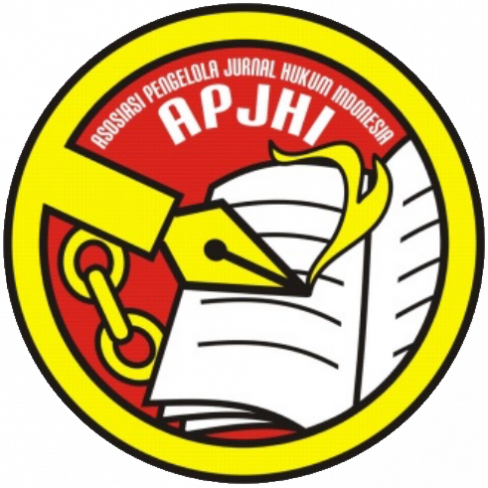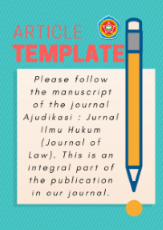Constitutional Relations Between The President, The House Of Representatives, And The Regional Representative Boards In Lawmaking After The Amendment Of The 1945 Constitution
DOI:
https://doi.org/10.30656/ajudikasi.v8i2.9638Keywords:
Constitutional relations, legislation, government, parlianmentAbstract
Amendments to the 1945 Constitution shifted legislation authority from the President to the House of Representatives. However, the strengthening of the House of Representatives into a 'super parliament' does not necessarily give it absolute power in lawmaking. Every draft bill, whether originating from the House of Representatives or the President, must be discussed and approved together to be enacted. From the outset, the 1945 Constitution did not apply the pure doctrine of Montesquieu's trias politica. The separation of powers is understood in the sense of 'distribution of power', making the House of Representatives and the President both have legislation authority. The bicameral parliament system allows the Regional Representative Boards to be able to submit draft bills relating to autonomous authority and participate in joint discussions. The participation of the executive in the discussion of the draft bill with the legislative is because the executive holds the function of implementing the law. Thus, the draft bill must be discussed together to obtain the approval of both institutions. Once approved, each draft bill will then be approved by the President.
Downloads
References
Agustina, Sita, ‘Analisis Tentang Pengaturan Oleh Pemerintah Dalam Sistem Pemerintahan Negara Hukum Indonesia’, Cakrawala Hukum, 5.2 (2014), 168–79 <https://jurnal.unmer.ac.id/index.php/jch/article/view/698>
Akbarrudin, Adika, ‘Pelaksanaan Fungsi Legislasi DPR RI Dan DPD RI Pasca Amandemen UUD 1945’, Pandecta : Jurnal Penelitian Ilmu Hukum (Research Law Journal), 8.1 (2013), 52–66 <https://journal.unnes.ac.id/nju/index.php/pandecta/article/view/2352>
Asshiddiqie, Jimly, ‘Pengantar Ilmu Hukum Tata Negara Jilid 1’, Buku Ilmu Hukum Tata Negara, 1 (2006), 200
DPR RI, ‘Undang-Undang Tentang MPR, DPR, DPD, & DPRD (UU No. 27 Tahun 2009)’, 2009, 1–239 <http://www.dpr.go.id/dokjdih/document/uu/UU_2009_27.pdf>
Munir, Ernawati, ‘Laporan Akhir Pengkajian Hukum Tentang Hubungan Lembaga Negara Pasca Amandemen Uud1945 Departemen Hukum Dan Hak Asasi Manusia Badan Pembinaan Hukum Nasioanal Tahun 200’, Departemen Hukum Dan Hak Asasi Manusia, 2005, 16
Nasional, ‘Undang-Undang Dasar Negara Republik Indonesia 1945’, Nasional, 105.3 (1945), 129–33 <https://webcache.googleusercontent.com/search?q=cache:BDsuQOHoCi4J:https://media.neliti.com/media/publications/9138-ID-perlindungan-hukum-terhadap-anak-dari-konten-berbahaya-dalam-media-cetak-dan-ele.pdf+&cd=3&hl=id&ct=clnk&gl=id>
Pemerintah Indonesia, ‘Perundang-Undangan Undang-Undang Dasar Negara Republik Indonesia Tahun 1945’, Undang-Undang Nomor, 23 (2017), 1 <https://www.mpr.go.id/img/sosialisasi/file/1610334013_file_mpr.pdf>
Pirmansyah, Miki, ‘Eksistensi Dewan Perwakilan Daerah Dalam Sistem Bikameral Di Indonesia’, Jurnal Cita Hukum, 2.1 (2014) <https://doi.org/10.15408/jch.v1i1.1461>
RI, DPD, ‘Peraturan Dewan Perwakilan Daerah Republik Indonesia Nomor 6 Tahun 2012 Tentang Pedoman Pelaksanaan Pengawasan Dewan Perwakilan Daerah Republik Indonesia’, Dewan Perwakilan Daerah Republik Indonesia Peraturan, 2012, 250–250
Romaliani, K, ‘Hubungan Kewenangan Presiden Dengan Dpr Dalam Pembentukan Undang-Undang Pasca Perubahan UUD 1945’, Jurnal Wacana Hukum, IX.April (2010), 74–84 <http://ejurnal.unisri.ac.id/index.php/Wacana/article/view/305>
Romli, Lili, ‘Problematik Dan Penguatan Sistem Presidensial’, Jurnal Communitarian, 1.1 (2018), 5–33 <https://doi.org/10.56985/jc.v1i1.70>
Rothbard, Murray N., The Anatomy of the State, Contemporary Anarchism, 2017 <https://doi.org/10.4324/9781351319324>
Sudirman, ‘Kedudukan Presiden Dalam Sistem Pemerintahan Presidensial’, Fakultas Hukum, Universitas Brawijaya, 2013, 1–27 <http://hukum.studentjournal.ub.ac.id/index.php/hukum/article/view/526>
Syaputra, Deni, ‘Kewenangan Presiden, DPR Dan DPD Dalam Pembentukan Undang-Undang Di Republik Indonesia’, Jurnal Menara Ilmu, XII.4 (2018), 29–38 <http://jurnal.umsb.ac.id/index.php/menarailmu/article/viewFile/731/650>
Toding, Adventus, ‘DPD Dalam Struktur Parlemen Indonesia : Wacana Pemusnahan Versus Penguatan DPD in the Structure of The Parliament’, Konstitusi, 14.2 (2017), 304
Asshiddiqie, J. Perihal Undang-Undang di Indonesia. Jakarta: Konstitusi Press, 2006.
Jimly Asshidiqie, Konstitusi dan Konstitualisme Indonesia. Jakarta: Sinar Grafika, 2011.
Downloads
Published
Issue
Section
License
Copyright (c) 2024 Ajudikasi : Jurnal Ilmu Hukum

This work is licensed under a Creative Commons Attribution-ShareAlike 4.0 International License.
Authors who publish with this journal agree to the following terms:
Authors retain copyright and grant the journal right of first publication with the work simultaneously licensed under a Creative Commons Attribution License that allows others to share the work with an acknowledgment of the work's authorship and initial publication in this journal.
Authors can enter into separate, additional contractual arrangements for the non-exclusive distribution of the journal's published version of the work (e.g., post it to an institutional repository or publish it in a book) with an acknowledgment of its initial publication in this journal.
Authors are permitted and encouraged to post their work online (e.g., in institutional repositories or on their website) before and during the submission process, as it can lead to productive exchanges and earlier and greater citation of published work.
All articles in Ajudikasi : Jurnal Ilmu Hukum can be disseminated provided they include the identity of the article and the source of the article (Ajudikasi : Jurnal Ilmu Hukum). The publisher is not responsible for the contents of the article. The content of the article is the sole responsibility of the author
Ajudikasi : Jurnal Ilmu Hukum is lincensed under a Creative Commons Attribution-ShareAlike 4.0 International License.









1.png)
.png)
.png)





.png)
.png)
.png)
.png)





.png)







